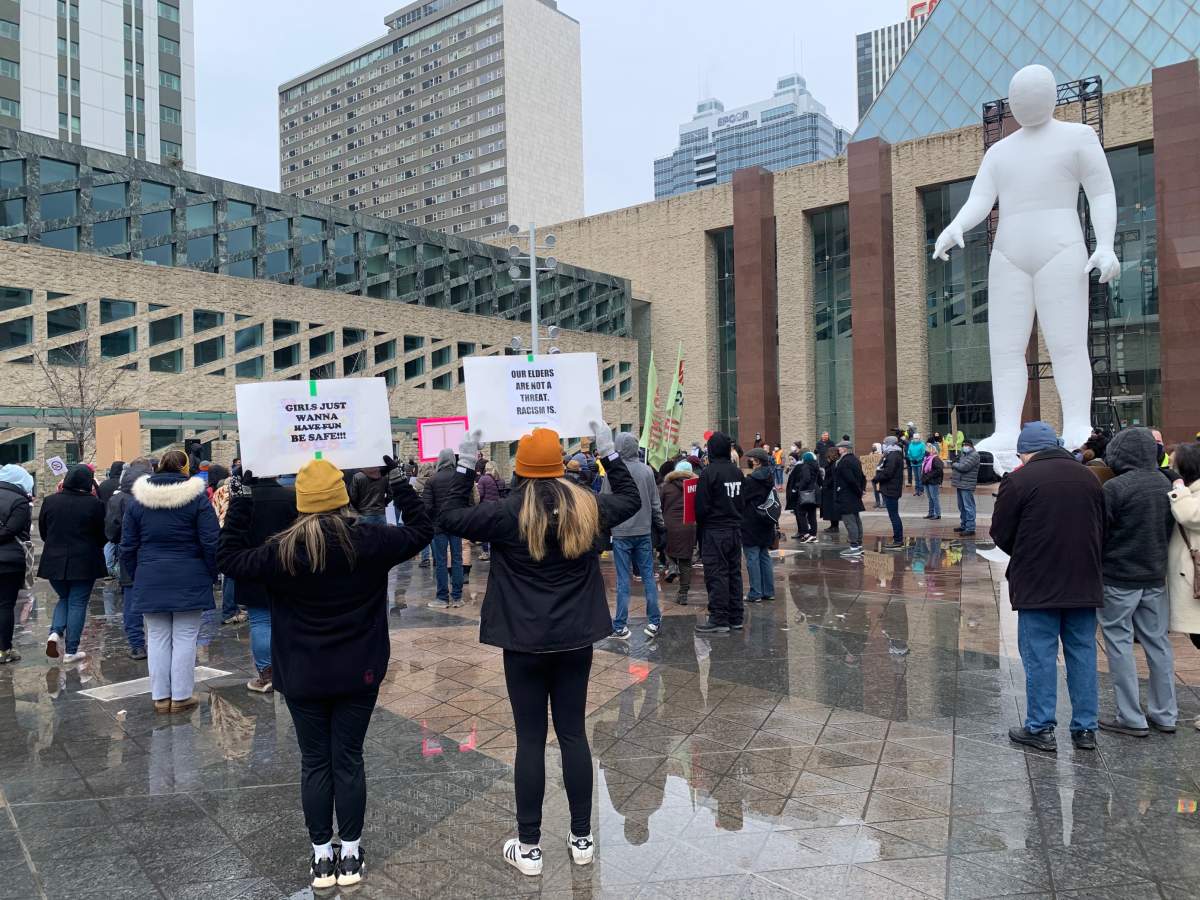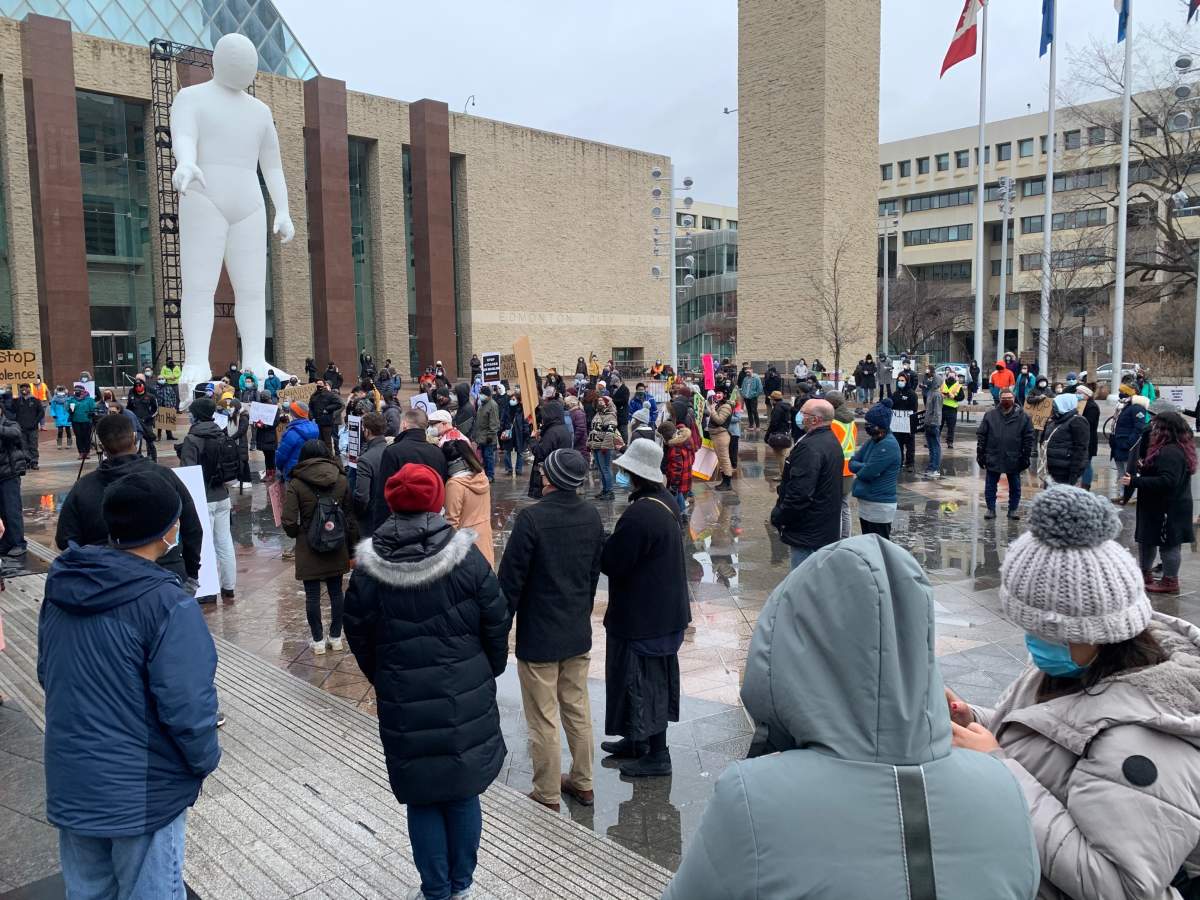The Building Bridges Against Hate walk was held in downtown Edmonton Saturday.

Dozens of people marched in the demonstration, which was spurred by the recent shootings of six Asian women near Atlanta, Georgia.
“There’s a lot of love in the community. In a few short days, the Black community, the Indigenous community, and Muslim and the LGBTQ community, along with the Asian community, banned together,” Act to End Racism spokesperson Serena Mah said.
“They came together, they sat in this space and they were peaceful and they said, ‘Racism is not OK, hate is not OK and neither is discrimination.”
READ MORE: Man accused in Atlanta spa shootings faces malice murder, aggravated assault charges
Robert Aaron Long, a 21-year-old white man, is accused of killing four people inside two Atlanta spas and four others at a massage business about 50 kilometres away in suburban Cherokee County. Six of the eight people killed were women of Asian descent.
The shootings have sparked outrage among Asian communities, who viewed the attacks as racially motivated.

Get daily National news
Hate crimes against Asian communities have skyrocketed by almost 150 per cent in the U.S. since the COVID-19 pandemic began last year, according to an analysis of police department statistics released by the Center for the Study of Hate and Extremism (CSHE) earlier this month.
Mah said she and her family are among those who have been targets of hate against the Asian community.
“I have to tell you racism is not new for me, microaggressions are not new for me, slurs online are not new for me, but what’s new for me is that my young son is now being targeted; that is not OK,” Mah said.
“It hit me straight in my heart.”
READ MORE: Why are Alberta’s Black, Muslim women being attacked?

There have been a series of racially motivated assaults against mostly Black Muslim women in Edmonton in recent months, as well.
In early December, two Somali women wearing hijabs were attacked outside a south Edmonton shopping centre in what police said was a “hate-motivated incident.”
Less than a week later, a 23-year-old Black woman wearing a hijab was at an Edmonton transit station when she was approached by a woman she didn’t know. Without being provoked, police said the suspect allegedly tried to hit the woman in the head with a shopping bag while yelling “racially-motivated obscenities at her.”
In February, a woman wearing a hijab was waiting inside the University of Alberta transit centre when she was approached by a man she didn’t know. Police said he made racial comments and postured “as though he was about to assault her.”
In an unrelated incident on the same day, a woman wearing a burka was walking on the sidewalk when she was approached by an unknown man who stopped her, yelled and swore at her and pushed her to the ground.
“There’s something that’s very different that’s happening right now: it’s very explicit, it’s very violent, it’s very public, it’s very outright and lots of people are feeling that,” rally volunteer Keren Tang said.
“It’s time for action. We have our Muslim sisters being attacked just for going to the grocery store or the transit. These are everyday things.”
READ MORE: Police say Edmonton’s Indigenous population is ‘highly victimized’ amid rising racism in city
There is a call by those who attended Saturday’s march for a provincial database to track hate incidents.
“Any kind of metrics is really important when it comes to racism and discrimination because if we don’t track incidents, we don’t exactly know what’s happening in the community,” Mah said.
“Why do we want to know what’s happening in the community? Because that drives policy, that drives policy in-regards to supports and it also gives us an accurate picture about what’s happening.”
Mah would also like the threshold to be lowered for a hate crime, for politicians to be more vocal against racism and more support for victims.
Organizers of Saturday’s march said they wanted to create a safe space where people of all ethnicities could empower one another.




Comments
Comments closed.
Due to the sensitive and/or legal subject matter of some of the content on globalnews.ca, we reserve the ability to disable comments from time to time.
Please see our Commenting Policy for more.